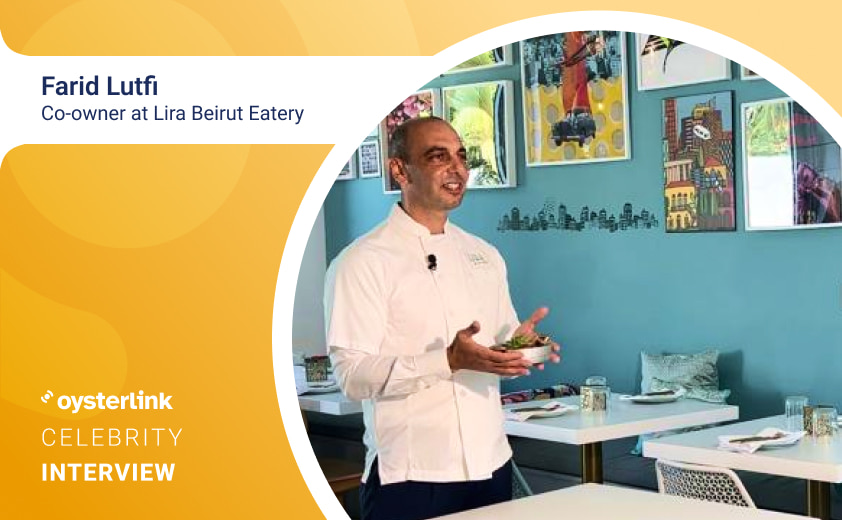Have you ever dreamed of opening your restaurant? It sounds glamorous, right? But what’s the reality? Our team decided to dig in and find out what it takes to go from restaurant worker to a restaurant owner.
Is there a secret recipe for success? We met with Farid Lutfi, co-owner of Lira in Miami. With decades of experience and a hospitality degree, Lutfi’s turning Miami on to the flavors of Beirut. We talked about his journey and the essential ingredients for running a thriving restaurant.
So, if you’re craving your restaurant venture, keep reading! We’ll be serving valuable insights to help you navigate the kitchen and the business side of things.
What inspired you to open a restaurant in Miami?
Mr. Lutfi: I was born and raised right in the heart of a family restaurant business. Growing up in Lebanon, I can’t remember a single Sunday where we weren’t all gathered for lunch at one of my grandmothers’ houses – both phenomenal cooks, by the way. Or else, we’d be exploring the incredible variety at a local Lebanese restaurant. That’s how I soaked up my food knowledge – through the tastes, the visual appeal, and the sheer diversity of it all.
What challenges did you face when starting your restaurant?
Mr. Lutfi: I figured sourcing the good ingredients – sumac, tahini, pomegranate molasses – would be the biggest challenge. Finding those unique ingredients is my passion.
But honestly, the most difficult part was the whole build-out process.
Permits, licenses, grease traps – you name it. All that stuff was a real headache.

How do you differentiate your restaurant and attract customers in such a competitive market?
Mr. Lutfi: In a food scene bursting with fusion creations and Latin flavors, Lira stands out. It’s a full-on immersion into Lebanese tradition, from the very name to the décor. The moment you step inside, you will be surrounded by the sights and sounds of Beirut. The menu is a celebration of authentic dishes, and even the wine list reflects the culinary heritage.

What qualities do you look for when hiring culinary professionals?
Mr. Lutfi: Hiring was a big lesson for me early on. I used to focus on experience, but general kitchen experience didn’t always translate to Lebanese cuisine.
Now, I look for passionate cooks, even if they’re new to the scene.
It is easier to mold them and introduce them to the unique flavors and techniques of Lebanese cooking. Perspective chefs get excited about the unfamiliar and take pride in mastering these new skills.

What advice would you give to aspiring restaurant owner?
Mr. Lutfi: For aspiring restaurateurs from the Middle East, here’s a crucial tip: Don’t get wooed by the success stories you hear back home. Opening a restaurant here in the US is a different experience compared to the Middle East.
In Lebanon, for example, you might be able to open your doors first and then tackle the permits later. It’s a much more flexible approach. Here in the US, it’s completely flipped. Getting all the permits and licenses in order is a great challenge. You need to clear all the permits before you even think about welcoming your first customer.
But listen, even failures can be valuable lessons. While hearing about success stories is inspiring, understanding the challenges faced by others can be even more educational. Don’t be afraid of setbacks; they’ll equip you with the knowledge and resilience you need to navigate the restaurant business here in the US.
What financial advice would you give to aspiring restaurant owners?
Mr. Lutfi: Don’t jump straight into building your dream restaurant from the ground up. Even well-funded ventures can struggle with the complexities of construction and permitting. This would be my strategy for a smarter approach.
Consider looking for existing restaurants that are already up and running and available for purchase.
This approach can save a significant amount of your time and money compared to starting from scratch. It is important to note that if the existing restaurant has a decent monthly rent, it indicates a somewhat established customer base, which is an immense plus. This allows you to focus on perfecting the menu, building your brand, and creating a loyal customer base rather than getting bogged down in the construction phase.
What do you love the most about being a restaurant owner?
Mr. Lutfi: In one sentence: “The best way to find yourself is to lose yourself in the service of others”, Mahatma Gandhi.

What final piece of advice would you give to young chefs and job seekers in the restaurant industry?
Mr. Lutfi: The restaurant industry has come a long way. It’s not just about creating a delicious meal anymore. It’s a full-on experience, meticulously crafted from the moment a guest walks into the moment they leave.
Think of it like a symphony. Every element plays a role: the ambiance, the color scheme, the menu design, the music playing softly in the background, the way your dishes are plated, even the chinaware, and the comfort of the chairs.
Top it all off with friendly service, a clean and inviting interior, and a team that truly cares – that’s the recipe for success today.
So, is the road to restaurant ownership paved with rainbows and butterflies? Not quite, as Farid Lutfi attests. It’s a demanding path, but one that can be incredibly rewarding.
Farid reminds us that the restaurant experience starts well before the first customer walks in the door. It’s about crafting a brand, using social media to create a buzz, and attracting talented staff – the backbone of any successful restaurant.
Finding and keeping great people is a major challenge in the industry, with good candidates often snatched up quickly. Oysterlink is here to streamline your hiring process. Sign up for early access and get a head start on building your dream team.
About Lira Miami
Lira Miami brings the rich flavors of Lebanon to Wynwood. Lira’s menu features generations-old recipes, while the unique decor reflects modern Lebanese art and music. Lira provides a pleasant dining experience for its patrons.




